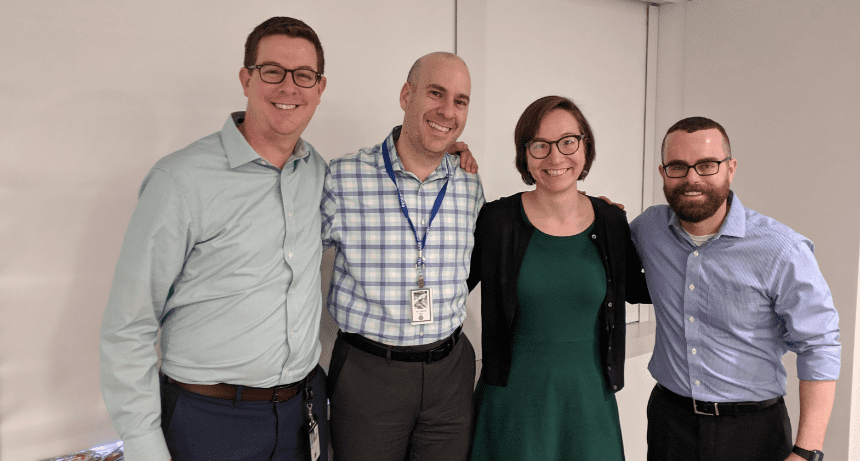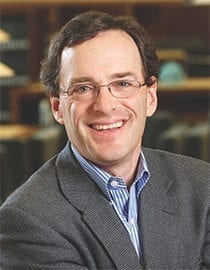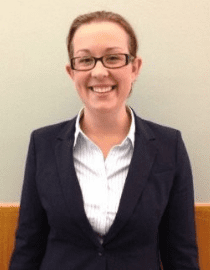
By Andrew Cohen
With America’s bitter partisan divide on perpetual display in Washington, D.C., six Berkeley Law graduates are enjoying a rare Beltway feat — working on issues supported by both sides of the aisle — at the Federal Trade Commission.
Robin Wetherill ’18, Dan Dwyer ’12, Brady Williams ’19, Christina Shackelford ’14, Jarad Brown ’13, and Vanessa Ing ’18 strive to protect consumers from unfair, deceptive, or anti-competitive business practices and transactions without stifling legitimate commercial activity. They credit Berkeley Law’s public mission and consumer justice opportunities as key ingredients in their career recipe.
Wetherill recently won the FTC’s annual Stephen Nye Award, which recognizes an agency lawyer whose work far exceeds what is usually expected of a relatively new legal practitioner.
“When I came to law school, I was interested in finding concrete ways to help people using the law,” she says. “Consumer law struck me as a good tool for offering that concrete help and Berkeley Law offered me a number of ways to pursue that.”
Wetherill took Consumer Law with Ted Mermin ’96 as a 2L, then participated in the East Bay Community Law Center’s Consumer Justice Clinic for three semesters.

“Those were the real turning points in my career,” she says. “The class offered a broad vision of what consumer law could be and the clinic work provided an opportunity to see how consumer law plays out in the lives of real people — and also that legal advocacy in this area could make a real difference.”
Mermin has fueled the school’s growth in the field (it now offers more than 10 consumer law-oriented courses) and directs its Berkeley Center for Consumer Law & Economic Justice, created in 2018. Student-led groups also propel this momentum: the Consumer Advocacy and Protection Society celebrated its 10th anniversary last year and the Consumer Rights Workshop helps low-income area residents with issues such as debt collection lawsuits, defaulted student loans, and identity theft.
After parlaying her experience into a summer internship at the FTC, Wetherill leapt at the chance to return full-time. She now works in the Bureau of Consumer Protection’s Division of Privacy and Identity Protection, focusing mostly on privacy and data security matters, which represents a relatively new frontier for consumer protection law.
“At a time when new technologies are rapidly and continually reshaping our lives in many ways, it’s part of my job to help assess how laws like the FTC Act, which is over 100 years old, apply to these new scenarios,” Wetherill says.
A step ahead
Dwyer, who joined the FTC full-time in 2012, works in the Bureau of Consumer Protection’s Division of Financial Practices on everything from debt collection and auto financing to mortgage advertising and student loan debt relief. In addition to investigations, negotiations, and litigation, he works on various policy matters.
Like Wetherill, Dwyer says “having both significant academic and practical experience at Berkeley Law meant I could hit the ground running.” Now, that experience helps him work nimbly amid the COVID-19 pandemic, which spawned an alarming number of companies making false or unsubstantiated claims about a product’s ability to combat the virus.

Dwyer filed a case against a company the agency alleges was falsely claiming to be an approved Paycheck Protection Program (PPP) lender. He also worked with the Small Business Administration to issue joint warning letters about potential deception directed at small business owners who were seeking PPP loans.
“The FTC quickly began directing resources toward this area, initiating daily releases of COVID-19 consumer complaint data to help law enforcement partners and the private bar stay on top of what consumers were reporting,” Dwyer says. “We also ramped up our consumer education work to help people avoid the types of frauds (such as government impostors, non-existent debt relief, and charity scams) that often accompany significant emergencies and financial downturns.”
While litigation against each company was unrealistic given the scale involved, FTC warning letters informed companies that their representations may be unlawful, urging them to remove or revise their claims. Other steps to curb pandemic-related fraud included launching a public-facing webpage to distribute consumer and business education materials and track relevant enforcement actions.
For Williams, “it was very satisfying to be able to work on such a salient and important social issue at such an early stage in my career.” In almost every case, he adds, “the companies quickly complied with our requests.”
Williams, who co-chaired both the Consumer Advocacy and Protection Society and the Consumer Rights Workshop as a student, joined the FTC’s Division of Advertising Practices in September 2019. He works primarily on investigating potentially false or misleading advertising in a range of industries and assisting with enforcement actions when appropriate.
In Mermin’s class, he helped draft and submit an amicus brief in a major consumer law case before the California Supreme Court — De La Torre v CashCall, Inc. — and later converted it into a California Law Review article. Even before law school, Williams’ personal statement in his Berkeley Law application described that his dream was to work in the FTC’s Bureau of Consumer Protection.

“Berkeley’s uniquely strong consumer law community helped turn that dream into a reality,” he says. “It was one of the few top schools I was considering that had a consumer law student organization and a consumer law clinic. These resources were vital reasons for attending Berkeley, and they certainly paid off. I was uniquely prepared to secure my position at the FTC, and I’m certain that no other school could have matched these opportunities.”
Dynamic and diverse projects
Shackelford joined the FTC in January 2017 and recently accepted a detail assignment to its Technology Enforcement Division. Created in 2019, the division focuses on identifying and investigating anti-competitive conduct in technology markets.
During her time at the agency, she has worked on cases in myriad industries, including oil and gas, real estate, and technology markets, conducting investigational hearings, leading an investigation, and managing case teams. Working remotely since March does come with hurdles, she admits.
“Although this new work environment has been challenging at times, particularly since we typically work in teams on our investigations, we’ve found ways to connect effectively, including through videoconference, chat, and by phone,” Shackelford says.
While many law students grapple with vexing career decisions, Brown isn’t one of them. “I first came to the FTC as a 1L summer law clerk, which turned into a brief 2L summer clerkship, and ultimately a job right out of law school,” says Brown, who took Mermin’s Consumer Law course as a 2L. “I was hooked from the start.”
As a lawyer in the Division of Privacy & Identity Protection, his work mostly involves investigating businesses for potential privacy- and security-related violations of the FTC Act or other laws the agency oversees, and bringing enforcement actions when needed. He calls his role “a perfect overlap” of his two main interests: technology and business oversight.

“I was lucky enough to fall in with Berkeley’s consumer law student community in my 1L spring,” Brown says. “Their mentorship helped me land my FTC internship and succeed at it, and enriched my experience during that summer. I’m delighted by the growth of the consumer law program because it will expose more students to this important area of law and motivate them to seek out opportunities in it.”
Ing, who joined the agency’s Division of Enforcement in October, previously spent a summer at the agency and had a “great experience.”
Her work now focuses on monitoring compliance with federal court and administrative orders obtained by the FTC against businesses engaged in fraud, investigating conduct that violates those orders, and litigating civil contempt actions and related new actions against the violators.
“The work was interesting and meaningful, and the people were smart and supportive,” she says of her summer clerkship. “I was happy to return. Also, I really enjoyed my Civil Procedure and Administrative Law classes at Berkeley, so I thought doing litigation at a federal administrative agency would be a good fit for my interests … I’m fortunate to encounter the full spectrum of consumer protection practice areas.”